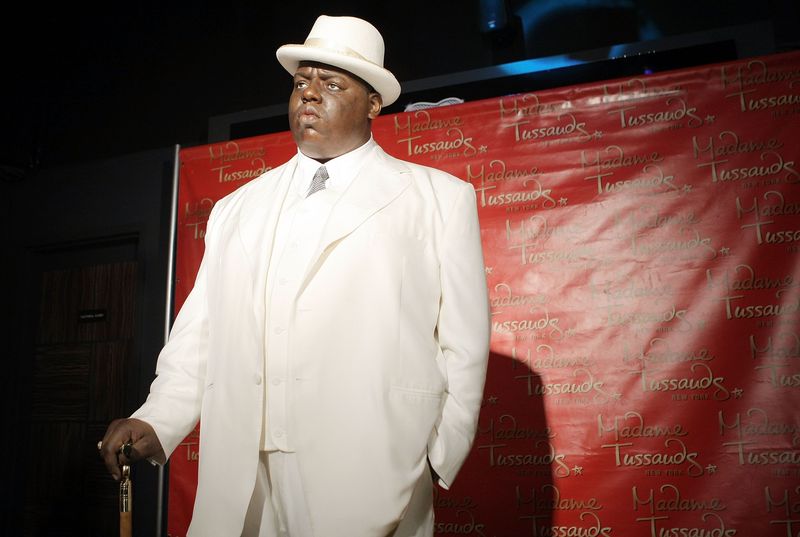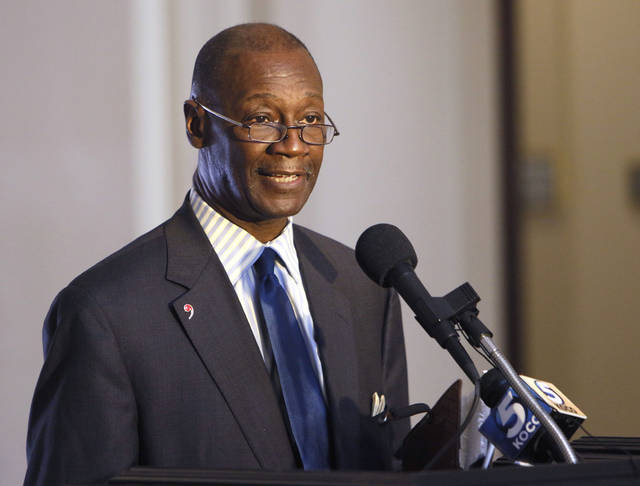
by Kristian Winfield @Krisplashed
Biggie was a culture. He was Brooklyn. And the Nets’ ceremony commemorating him on the anniversary of his death showed why.
BROOKLYN, N.Y. — Take a ride through the streets of New York’s greatest borough and you’ll stumble upon some of the world’s best street art and brick wall murals. At least one of them will be dedicated to the late, great Biggie Smalls.
Biggie is revered as the greatest rapper to ever grace a microphone. His lyrics take you on his journey from moving drugs through the streets of Brooklyn at age 12 to his rise atop the rap game’s food chain, teasing the spoils of his success as each side story in-between.
It was a tale that resonated with everyone growing up in Brooklyn during his era.
“He was a culture,” said Knicks forward Lance Thomas, who grew up in Brooklyn before playing high school basketball in New Jersey. “Growing up in New York, obviously I’m a fan, and I got a chance pay my respects to him and his family for all the things that happened to him. So that was special.”
You probably know Biggie for hits like “Juicy,” “Big Poppa,” and “Going Back to Cali.” You might have heard “10 Crack Commandments” and “I Got a Story to Tell.” If you’re from the West Coast, you probably know him as the subject of Tupac’s “Hit Em Up.”
Having been born in Fort Greene and living in BedStuy most of my life, I’ve heard them all.
But I was just 4 years old when Biggie was killed in a drive-by shooting in Los Angeles in 1997, a moment that ripped the soul out of a community built around his remarkable success story. When he made it, everyone made it. When he got shot, the four bullets ricocheted off every brownstone building into each corner store, basketball court, sidewalk, and stoop in Brooklyn, piercing the populace’s collective hearts along the way.
I was barely old enough to understand the concept of death, let alone the gravity of what his death meant to my city. While my older brother tried his hardest to force me into listening to Biggie’s albums, I wanted to play video games and run around with my friends.
I always knew why Biggie was the greatest rapper of all time. I was just too young to fully appreciate what he meant to me.
That changed when the Brooklyn Nets honored him Sunday on the 20th anniversary of his death.
You could tell this night would be different during pregame warmups.
Old-school hip-hop beats reverberated throughout the arena. Biggie’s trademark Timberland boots and COOGI sweaters flooded the Barclays Center sidelines. The distinct aroma of Hennessy wafted about the crowd — V.S. or Privilege? My nose needs refining.
It was what you’d expect a ‘90s party to look and feel like.
Surprisingly, Voletta Wallace had no part in planning the 20th anniversary of her son’s passing. In the two decades that followed Biggie’s tragic shooting, Wallace hadn’t seen one of his murals until last November, nor had she ever been to an NBA game until Sunday night. She merely showed up with her family at the Nets’ request.
“This is very, very surreal. Very surreal,” Wallace told SB Nation. “Had he been alive, he would have been elated.”
It’s safe to say the Barclays Center did her son right:
The Nets just permanently hung a No. 72 jersey from the rafters dedicated to Biggie Smalls
The team raised a No. 72 jersey to the rafters in honor of Biggie’s birth year. It hangs next to Jay-Z’s, another Brooklyn hip-hop legend who sold out eight concerts at the arena’s inception in 2012. It’s no coincidence the two now hover side by side.
The courtside row was packed with hip-hop celebrities, including Diddy, Ice Cube, and Lil’ Kim. Faith Evans, the mother of Biggie’s son Christopher Jr., was in attendance. Brooklyn boxer Danny Jacobs also sat courtside, taking a moment to pay homage before his upcoming middleweight championship fight against the undefeated Gennady “GGG” Golovkin.
Every in-game break featured a different Biggie classic, the Brooklynettes dance team moving accordingly.
Diddy moved the crowd with his halftime speech, calling for 10 seconds of “Brooklyn noise” rather than a moment of silence:
Diddy just demanded 10 seconds of Brooklyn noise instead of a moment of silence for the 20th anniversary of Biggie’s death.
It was a celebration of the 24 years Biggie graced the earth, not a mourning of a soul taken far too soon.
Brook Lopez reminded everyone in the first quarter by joining Buck Williams as the only Nets players to score 10,000 points in franchise history. Carmelo Anthony also joined the club shortly. After two buckets in the first quarter, Anthony notched his 10,000th point in a Knicks jersey. He’d finish with 27 points, including 12 in the fourth quarter.
But his output wasn’t nearly enough, given the following circumstance:
Puffy staring at Carmelo and nodding in approval after every shot is my favorite part of this game.
As it turns out, Biggie was a huge New Jersey Nets fan, his mother told SB Nation. He would have been no older than 5 when Julius Erving led the Nets to their second ABA championship in 1976.
And he was probably smiling down on the Nets Sunday during their impressive performance against a demoralized Knicks team. Brooklyn had lost 16 straight home games until beating the Knicks, 120-112. The Nets singed New York from deep, nailing 19 of their 38 three-point shots.
“Biggie Smalls was definitely in full effect in Brooklyn tonight,” Anthony said when asked about his team’s poor defensive effort. “The spirit was here tonight.”
It was just a few months ago I decided to pick up a Biggie album and listen all the way through — something my brother had wanted me to do for years. I consider my music palate much more refined now than a decade ago. Polluting my ears with trap music in college likely delayed that process.
My album of choice: Life After Death, the posthumous project released two weeks after his passing.
It was the album in which Biggie, in all his glorious braggadocio, expertly detailed how he weaseled his way out of getting caught sleeping with the wife of an unknown Knicks player, in a track rightfully named “I Got a Story to Tell.”
It was the album in which he dropped “Somebody’s Got to Die,” one of the greatest works of storytelling in the history of hip-hop music. And it was the project that featured “I’m Going Back to Cali,” a song he recorded ahead of the fatal trip he took to record the music video for “Hypnotize.”
Biggie is known as the most untouchable storyteller of all time, but that’s not what his mother wants you to know. She doesn’t want you to know he dealt drugs as a teenager.
For Wallace, her son was much more than what he did for a living.
“All I can say is here is this young man who brought so much love to a community, to a people. That is just enormous,” she told SB Nation. “I’m a mother. Christopher was my son. And to see all the love, I’m just deeply touched. Very, very touched by it.”
As I leave Barclays Center, I re-listen to Life After Death. There’s a Biggie mural just a block off the route to my bus. I’ll take the detour.
When I get home, I’ll talk with my brother about all the Biggie I ingested on the way there. Then in the morning, I call my mother, just to let her know how much I love her.
See, Biggie wasn’t just a rapper. He wasn’t just a drug dealer turned hip-hop mogul. He was, as Lance Thomas said, “a culture.” A culture I hadn’t appreciated enough growing up. Now, thanks to the Nets, he’s immortal, with his jersey cascading from the rafters in Brooklyn.
He was immortal, though, long before the Nets decided to honor him 20 years after his passing.
I didn’t know. Now I know.












